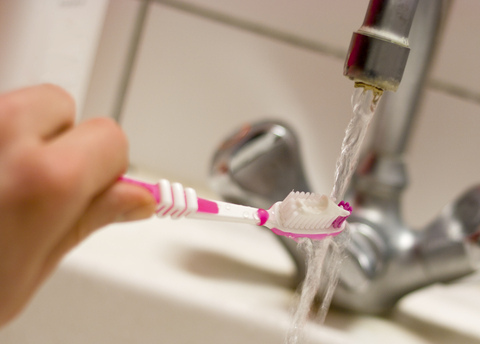January 7th, 2026

Have you ever wondered why people have wisdom teeth? These are a third set of molars that come in behind the rest of all your other teeth, usually during early adulthood. Scientists and anthropologists believe that wisdom teeth are a result of evolution, because our ancestors needed these extra teeth to handle their primitive diets. Nowadays, the average diet consists of fewer hard-to-chew foods, which renders wisdom teeth largely superfluous.
Most people begin to experience wisdom teeth pain between the ages of 17 and 25. Our ancestors nicknamed them wisdom teeth because they appeared at a time in life when we supposedly grew wiser.
If you’ve already had your wisdom teeth removed, you know how painful they can become if they aren’t taken care of promptly. If not, watch out for discomfort in the back of your mouth and let Dr. Kerry Olszewski know right away if you think your wisdom teeth are coming in.
In some cases, people do not experience any problems or discomfort with their wisdom teeth. These patients may keep their wisdom teeth intact if there’s enough room in their jaw to fit them properly. But this is generally not the case, so wisdom teeth can cause several concerns, depending on which direction they grow.
Common problems include:
- Damage to surrounding teeth due to the pressure from the emerging teeth
- Infection that causes the surrounding gums to swell and become painful
- Tooth decay due to the lack of room to clean the teeth properly
- Impaction (when the tooth is unable to break through the skin)
- A cyst that may damage the jaw, the surrounding teeth, and nerves
If you haven’t had your wisdom teeth removed yet, there are many symptoms to watch out for when they begin to grow. Symptoms may include:
- Pain or stiffness in the jaw
- Tooth irritation
- Swelling of gum tissue
- Crowding of other teeth
- Spread of tooth decay or gum disease on nearby teeth
If you’ve noticed these symptoms, schedule an appointment at our Mill Creek office. Don’t forget: This is a common procedure that will take some time to recover from. Allow your mouth to heal, and then you’ll be able to get back to a normal routine quickly and be free from pain!
January 7th, 2026

You may have heard talk about the germs that can reside on your toothbrush and thought, “really?”
It’s true—there are several kinds of bacteria that can lurk on the bristles of your toothbrush, including streptococci, staphylococci, Herpes Simplex I, and the Influenza virus. To protect your toothbrush from bacteria, Dr. Kerry Olszewski and our team want you to consider the following three tips:
- Wash your hands before and after brushing.
- Allow the brush to air dry after each use, as harmful bacteria dies after being exposed to oxygen. It is best to disinfect your toothbrush weekly and allow it to dry in between use. Store the toothbrush in an upright position to allow water to drain and dry faster
- Replace your toothbrush every three to four months, or after being ill. Worn bristles are less effective in properly cleaning your teeth, and can actually be damaging to teeth if used too long!
We hope these tips help! Feel free to give us a call at our Mill Creek office or ask us on Facebook if you have any questions!
January 7th, 2026

Perhaps you had a particularly irritating commute home from work, and you realize at the end that your jaw was clenched tight the entire time. Or maybe you grind your teeth when you are nervous or anxious about an upcoming business meeting. Most people grind their teeth from time to time, but it’s important to recognize the signs and symptoms of chronic tooth grinding. Known as bruxism, this condition can lead to oral health problems and dental issues later.
Signs and symptoms of bruxism
- Your partner might complain about the fact that you grind your teeth while you sleep. People who grind their teeth on a regular basis often do so during the night, and aren’t necessarily aware it is happening. However, your partner will more than likely notice if you develop this condition. If he or she mentions that it happens often, you might want to contact our team at Mill Creek General Dentistry.
- You may experience a persistent and unexplained headache if you grind your teeth too often. You may not realize why you have this headache, because you are not aware of the fact that you have been grinding your teeth. Take note of any headaches you have, and if you cannot attribute them to another source, please give us a call to set up an appointment with Dr. Kerry Olszewski.
- Your jaw will more than likely become sore if you suffer from bruxism. If you wake up in the morning and have any discomfort in your jaw, you might have spent the night grinding your teeth. Our team can give you tips and advice for managing bruxism.
While many people associate their teeth grinding with stress, it actually is caused more often by crooked teeth, an overbite, or an under bite. If left untreated, bruxism can lead to a variety of complications, including dental injuries, hearing loss, and the onset of TMD. If you think that you might be a chronic tooth grinder, it might be time to set up an appointment at our Mill Creek office in order to find out which treatment options are available to you.
December 31st, 2025

Toddlers are notoriously balky about strangers. But their first dental visit should not be cause for fear and tears. Nor should you assume that getting your toddler to Mill Creek General Dentistry is going to involve a full-blown tantrum or Mafia-style bribery. “Honey, don’t worry. We’ll go get ice cream after…” sort of defeats the purpose of making that first dental appointment.
These five tips will make your toddler’s trip to see Dr. Kerry Olszewski as fun as a stop at an amusement park.
1. Before you make a dental appointment for your child, take him or her on a ride-along to one of your dental appointments. Let your son or daughter experience the office and get the lay of the land. Toddlers don’t like surprises. But if your little one is already familiar with the big chair that goes up and down, the next time he or she will have no problem taking a seat.
2. About the big dental chair … well, it’s really an amusement park ride. See how it goes up and down? Toddlers love games, and turning the trip to the dentist into a game is among the oldest (and most successful) tricks in the parent playbook.
3. Positive reinforcement is a good thing. That's why Dr. Kerry Olszewski and our staff hand out cool toothbrushes or stickers to children after their appointment. A fun-colored toothbrush with a suction bottom is a good incentive to come back for another cleaning.
4. Timing is everything. Don’t take your child to the dentist an hour before the daily nap. Make the appointment with your child’s schedule in mind. This increases the chances of success.
5. A few days before the scheduled appointment, start reading your toddler bedtimes stories about what happens at the dentist. Dora the Explorer’s Show Me Your Smile, written by Christine Ricci, is a popular dental story that your child might relate to.



